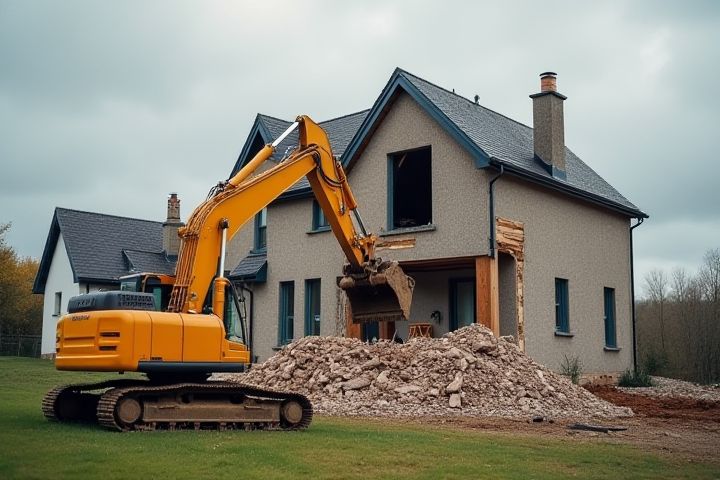
Demolishing a house involves several critical steps, including obtaining necessary permits, conducting an environmental assessment, and ensuring safety measures are in place. You must first check local regulations that dictate the demolition process, as different areas have specific requirements regarding noise, debris disposal, and hazardous materials. Engaging a licensed demolition contractor can greatly streamline the process, providing expertise in handling structural issues and waste management. The cost of demolition varies based on the size of the house, materials used in construction, and the complexity of the job. Proper planning ensures that you not only comply with local laws but also consider the potential for recycling or salvaging materials from the demolished structure.
Can You Demolish A House
Obtain necessary permits
Obtaining necessary permits is a critical step in the house demolition process, often mandated by local regulations to ensure safety and compliance. Typically, you need to secure a demolition permit from your city's building department, which may involve submitting detailed plans and paying a fee ranging from $50 to several hundred dollars depending on your location. In some cases, especially if the house contains hazardous materials like asbestos, you may also need a special permit and a licensed contractor to handle the removal safely. Completing this step not only helps prevent legal issues but also ensures that the demolition adheres to local environmental standards.
Comply with local regulations
Complying with local regulations is essential when demolishing a house, as these rules dictate the procedures to ensure safety and environmental protection. You must acquire proper permits, which may include a demolition permit and possibly an environmental assessment, depending on your location and the structure's characteristics. It's crucial to notify utility companies to disconnect services like water, gas, and electricity before initiation, ensuring the safety of workers and surrounding properties. Failure to adhere to these regulations can result in hefty fines, delays, and potential legal liabilities, making compliance a top priority for any demolition project.
Conduct an asbestos survey
Conducting an asbestos survey is crucial before demolishing a house, as it helps identify potential asbestos-containing materials that pose health risks. Licensed professionals will inspect the property, testing materials like insulation, flooring, and roofing for asbestos fibers. This survey ensures compliance with local regulations and safeguards your safety and that of the workers involved in the demolition. Properly managing any found asbestos is essential to prevent contamination and ensure a safe demolition process.
Disconnect utilities
Before demolishing a house, it is crucial to disconnect utilities such as water, electricity, and gas to ensure safety and compliance with local regulations. Typically, you should contact utility providers at least two weeks in advance to schedule disconnection. The process often involves a technician visiting the property to safely turn off and cap lines, preventing potential hazards or damage during demolition. Failure to disconnect these utilities can result in fines or complications, highlighting the importance of thorough planning prior to demolition.
Notify neighbors
When planning to demolish a house, it is essential to notify neighbors well in advance to minimize disruptions. This notification allows them to prepare for potential noise, dust, and other impacts associated with the demolition process. Engage your neighbors through direct communication or formal letters detailing the timeline, safety measures, and any necessary precautions. Clear communication fosters community understanding and mitigates potential disputes during the demolition project.
Secure the worksite
Securing the worksite is crucial before initiating the demolition of a house. First, you must establish a perimeter using fencing or barriers to prevent unauthorized entry and ensure safety. Additionally, clearly marked signs should indicate hazardous areas and outline safety protocols for workers and bystanders. Properly managing utilities, such as water and electricity, further mitigates risks, creating a secure environment throughout the demolition process.
Choose appropriate demolition method
Choosing the appropriate demolition method for a house depends on various factors, including the structure's materials, location, and the surrounding environment. A controlled demolition utilizes explosives for buildings that are structurally sound and require timely demolition, while mechanical demolition employs heavy machinery like excavators and bulldozers, ensuring a safer and more manageable approach. For properties with hazardous materials such as asbestos, a careful deconstruction method may be necessary to safely remove materials without risk to health and safety. You can assess your specific situation, budget, and regulations to determine the best method, ensuring an efficient and responsible demolition process.
Manage waste disposal
Demolishing a house involves several critical steps, with effective waste disposal being paramount to the process. You must engage a licensed demolition contractor who can ensure that all waste materials, including concrete, wood, and hazardous substances, are properly sorted and disposed of in compliance with local regulations. Recycling is an essential aspect, as many materials can be repurposed, significantly reducing landfill waste. Implementing a detailed waste management plan not only minimizes environmental impact but also promotes sustainability within your community.
Ensure safety protocols
To ensure safety protocols during house demolition, conduct a thorough assessment of the structure, identifying any hazardous materials such as asbestos or lead paint, prior to initiating the process. Proper personal protective equipment (PPE), including hard hats, gloves, and respirators, must be worn by all workers on-site to prevent injury and exposure. Implement controlled demolition techniques to minimize dust and debris; using water spray can help suppress airborne particles effectively. Establish a clear perimeter around the demolition site, ensuring that only authorized personnel access the area, thus maintaining safety for both workers and nearby residents.
Hire professional contractors
Hiring professional contractors for house demolition ensures safety and compliance with local regulations. Licensed demolition experts utilize specialized equipment, such as excavators and wrecking balls, to efficiently dismantle structures, minimizing risks. A typical residential demolition project can range from $4,000 to $15,000, depending on factors like house size, materials, and site preparation. Your contractor will also manage the disposal of debris, allowing for an environmentally responsible approach to waste management.
